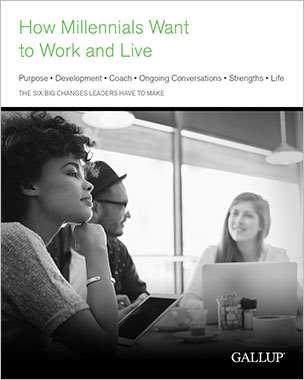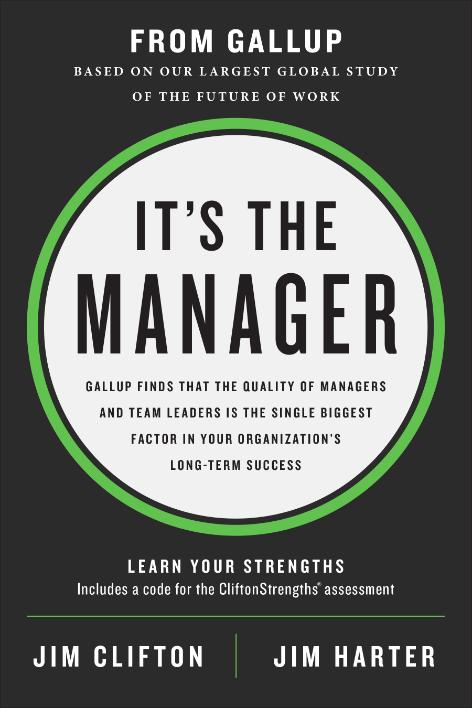Story Highlights
- Meaningful feedback improves productivity and performance
- Only 17% of millennials report receiving meaningful feedback at work
- Managers who encourage conversations about development improve outcomes
Millennials. The word itself evokes a response -- media, business leaders, scholars, everyone seems to have something to say about millennials.
About millennials, but not to them -- Gallup data show that only 19% of millennials strongly agree they receive routine feedback at work.
Worse yet, only 17% of millennials report receiving meaningful feedback. Routine feedback is better than none, but meaningful feedback -- the kind that helps individuals learn, grow, and do their jobs better -- is how you improve productivity and performance.
Managers play a pivotal role in any organization. Their actions dictate their company's success. Employee development dictates growth -- so managers of millennials need to focus on what is meaningful to millennials. Talk with them, not about them ... and start by learning what "meaningful" means to each worker.
Start with daily meaningful feedback.
If you were to ask your manager today what meaningful feedback sounds like, you'd get an answer, of course. But the answer would probably reflect how the manager defines meaningful, because that's who you asked.
Instead, managers should ask millennials, "How do you define 'meaningful feedback'?" Seems like an easy enough thing to discuss, yet managers still struggle to have meaningful conversations with employees.
The purpose of meaningful conversations is to inspire, and managers are struggling to inspire their employees. Gallup's report about performance management shows that only 14% of employees strongly agree that the performance reviews they receive inspire them to improve.
Routine feedback is better than none, but meaningful feedback -- the kind that helps individuals learn, grow, and do their jobs better -- is how you improve productivity and performance.
Here's what leaders and managers need to ask millennials -- and the rest of their employees -- to determine what meaningful signifies to them:
1. What's the best recognition you've ever received? People reveal the type of work that excites them -- and how they like to be commended -- when they talk about recognition. An employee who recalls when a division manager highlighted her analysis at a town hall meeting is proud of her intellectual contributions and prefers public acclimation. An employee who says the best recognition he ever got was a thank you note from a coworker gets energy from personal relationships and needs recognition to be one-on-one. Whatever their answer, use it to align job priorities and plan tailored, individualized feedback.
2. What do you want out of your career? Millennials have a burning desire to learn and grow, so their managers need to find the development bull's-eye for each person. While millennials demand growth and development from their workplace, not all of them want to become CEO someday. Their ambitions -- their expectations -- for their career path vary widely. Great managers ask great questions to uncover those individualized ambitions.
3. How are you doing? It seems too easy, but this question is more powerful and revealing than it might appear. The key to getting the most out of this question is listening to their answer. What issue or topic comes most immediately to mind for the employee? What do they talk about first? What do they talk about most? What do they seem hesitant or reluctant to discuss? Do they focus on work or something outside work? What are they excited about? Fearful about? Stressed about? Listening will tell you, and then you'll know how to help.
Create an environment that welcomes conversation.
Gallup research shows that 87% of millennials rate "professional or career growth and development opportunities" as important to them in a job. This desire to learn and grow requires managers to have meaningful conversations -- but it also requires millennials to speak up and ask for feedback.
Very few do -- only 15% of millennials strongly agree that they routinely ask for feedback about their work. And millennials are less likely than any other generation to strongly agree they have told their manager the one thing they "need most" to get their work done and why -- just one in three have done so.
Each worker and workplace is different, of course, but this reluctance to ask for feedback may be connected to insecurity. Millennials need to feel like their manager is in their corner before they feel comfortable describing what's meaningful to them. They need to know it's okay (even encouraged) to talk to their boss about development.
Millennials need to feel their manager is in their corner before they feel comfortable describing what's meaningful to them.
Creating that environment opens the door for two-way conversations and, better yet, frequent conversations. Gallup research indicates that engagement is highest among employees who meet with their manager at least once a week.
MarketWatch reported that 56 million millennials were working or looking for a job in 2017. As of 2018, millennials made up about 35% of the workforce. Your workforce. Development will improve their performance and millennials want it badly, but Gallup data show they're not getting the coaching they need.
Start the conversation:
- Use Gallup's decades of research as a guide to improve performance by building a culture of high employee development.
- Learn The Five Conversations That Drive Performance in the midst of changing workplace expectations.
- Move from boss to coach and help your team members maximize their potential.






